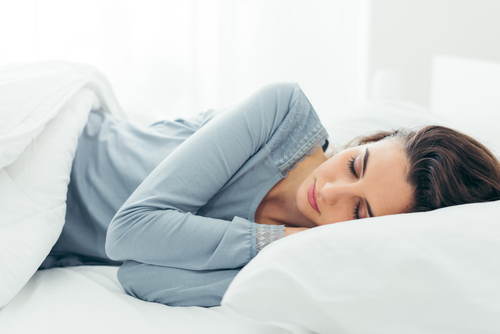It’s not at all unusual to experience insomnia from time to time. Most of us can remember nights we spent staring at the ceiling and glancing at the clock to calculate how many hours we have until we need to get ready for work. Once we get to work, we’re basically just trying to get through the day. We feel groggy and irritable; we can’t focus, and we have a hard time controlling our emotions.
Unfortunately, it seems that the rates of insomnia and other sleep-related disorders have increased in recent years. It could be that our lives have become more stressful as the labor market is more unstable. Our diets have also worsened, and we’re more engaged with technology than ever before. Whatever the causes may be, we’re all extra tired and extra sleep-deprived.
Although Cannabis had been used as a sleep aid for centuries, it’s only in the past few years that legislators have loosened restrictions regarding research into the potential medical applications of the plant. As a result of this research, CBD has become the newest buzzword in the health and wellness industry.
What is CBD?
The Cannabis sativa plant has more than 100 different cannabinoids, among which THC and CBD are the best known. THC stands for tetrahydrocannabinol and is responsible for the psychoactive effects we usually associate with “smoking weed”: relaxation, euphoria, increased appetite, a propensity for introspection and philosophical thinking and, eventually, sleepiness. THC creates these effects because of its ability to bind directly to the CB1 receptors of the endocannabinoid system.
CBD or cannabidiol is a non-psychoactive and non-addictive cannabinoid. Unlike THC, it cannot bind to cannabinoid receptors directly and works by stimulating the body to produce its own cannabinoids such as anandamide, thus promoting homeostasis. Many people are afraid that CBD-based products such as Organic CBD Nugs will make them “high,” but their worries stem from misconceptions. These products are, in fact, derived from hemp, a strain of Cannabis with less than 0.3% THC concentration. This is much lower than what would be needed to cause any motor impairment or euphoria.
CBD and Insomnia
Insomnia can have many different causes. It can result from external factors such as sleeping on an uncomfortable bed or in a noisy room. It can stem from drinking too much coffee or drinking coffee too close to your bedtime, from certain medications or a disruption in the circadian rhythm like jet lag or excessive exposure to blue light. Insomnia can also be a symptom of another condition such as ADHD, PTSD, depression, or anxiety.
People with insomnia often try to treat their symptoms with prescription sleeping pills, which, unfortunately, are not effective long term and can lead to addiction. Then there are over the counter medications, but these often cause daytime sleepiness, grogginess, and confusion.
There are several studies suggesting that CBD can be useful in treating symptoms of insomnia. However, you need to keep in mind that research is still in its infancy, so the precise mechanism through which CBD modulates sleep remains unclear. Since CBD seems to interact with serotonin and GABA receptors in the brain, researchers theorize that this lowers anxiety and promotes relaxation. Note that benzodiazepines (prescription drugs used to treat anxiety and insomnia) also target GABA receptors.
The most relevant study on the therapeutic benefits of CBD for anxiety and insomnia was published in 2019 in the Permanente Journal by Shannon et al. This study had 72 participants – 47 with anxiety and 25 with difficulties sleeping. After four weeks of receiving 25 mg CBD pills, 79.2% reported lower levels of anxiety, and 66.7% reported improved quality of sleep.
In a 2013 study published by Chagas et al. in the Journal of Psychopharmacology, CBD was injected into the peritoneum of Wistar rats at different dosages – 2.5 mg/kg, 10 mg/kg and 40 mg/kg. Based on the recordings they made of the light and dark periods over four days, it seems that CBD increased sleep duration in a dose-dependent manner, and the group that received 40 mg also had higher REM sleep latency.
Chagas was involved in another study on REM sleep with human subjects, published in 2014 in the Journal of Clinical Pharmacy and Therapeutics. Participants had Parkinson’s disease and REM sleep behavior disorder (RBD – a condition that makes the person act out their intense and sometimes violent dreams, common in patients with Parkinson’s). The study found a reduction in the intensity and frequency of RBD.
Things to Consider
CBD products come in different forms with different methods of application. You can choose from oils and tinctures, pills and capsules, edibles such as gummies, or vaping concentrates for faster results.
The dosage will depend on your weight and body chemistry. You should start with the lowest dose and work your way up to what gives you the best results. Note that small doses of CBD reduce daytime sleepiness and increase alertness, so when you begin, it’s better to take it in the afternoon until you find the level that induces sleep. Even if you have friends that have already tried it and they recommend a certain dosage, remember that what works for them won’t necessarily work for you.
As you saw from the studies we mentioned in the article, results are not immediate. The effects are assessed after about four weeks, so you’ll need to be patient.
CBD is generally well tolerated even at high dosages. We know this from clinical trials done for Epidiolex – an FDA approved drug for treating epilepsy seizures. They tested it on youths between 2 and 18 years old at an equivalent of 1,360 mg for an adult of 150 pounds. CBD is also not addictive, and researchers are looking into its potential application as a treatment for psychostimulant addiction.
However, CBD can enhance the sedation effects of alcohol and can interact with other medications. You should consult your doctor before trying it to make sure it’s safe, especially if you’re CBD, already taking prescribed medications to treat your insomnia.








